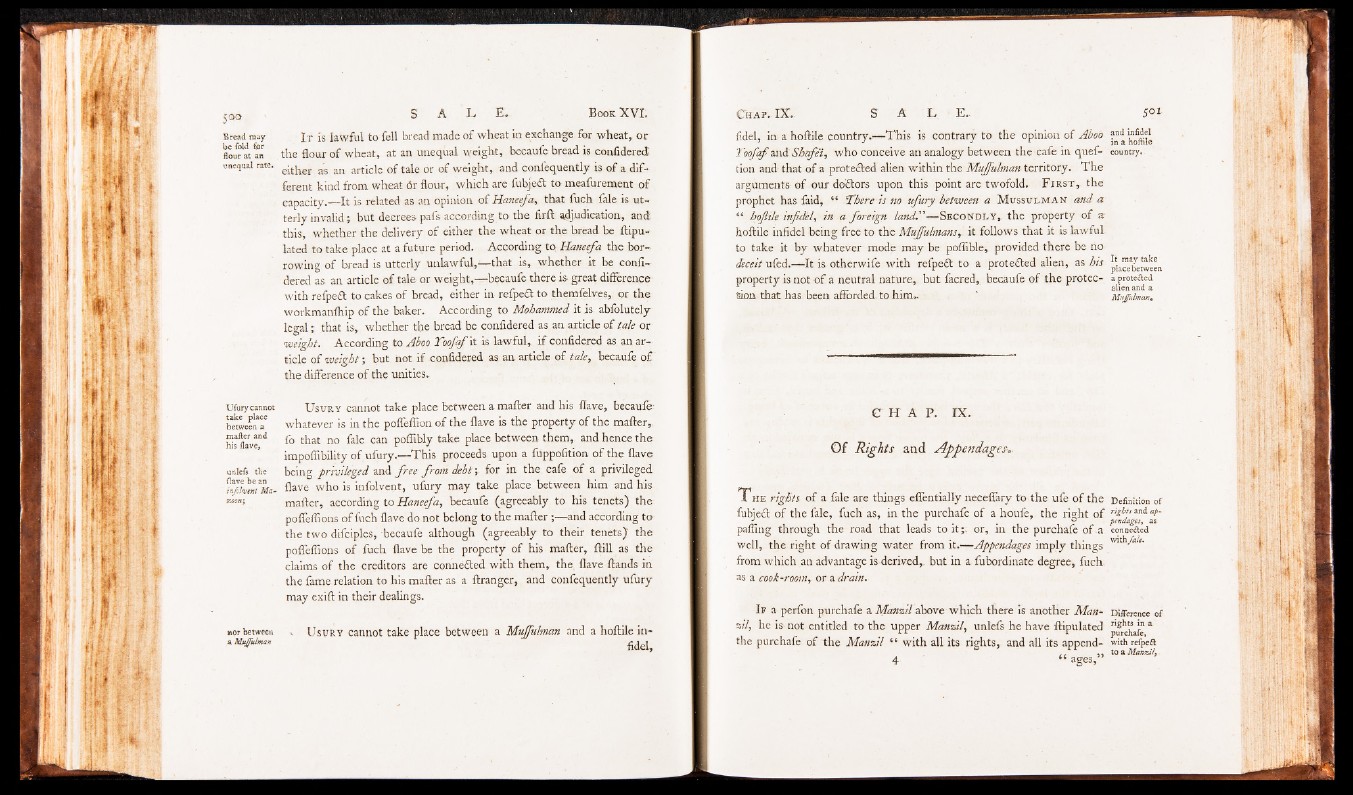
Bread may
be fold for
flour at an
unequal rate.
Ufury cannot
take place
between a
mailer and
his ilave,
unlefs the
flave be an
infol'vent Mazoorij
nQr between
a Mujfulman
I t is lawful to fell bread made of wheat in exchange for wheat,, or
the flour of vvheat, at an unequal weight, becaufe bread is confidered
either as an article of tale or of weight, and confequently is of a.different
kind from wheat 6r flour, which are fubjedt to meafurement of
capacity.— It is related as an opinion of Haneefa, that fuch fale is utterly
invalid; but decrees pafs according to the firft adjudication, and.
this, whether the delivery of either the wheat or the bread be ftipu-
lated to take place at a future period. According, to Haneefa the borrowing
of bread is utterly unlawful,— that is, whether it be eonfi-
dered as an article of tale or weight,— becaufe there is great difference
with refpect to cakes of bread, either in refpeft to. themfelves, or the
workmanfhip of the baker. According to Mohammed, it js abfolutely
legal; that is, whether the bread be confidered as an article of tale or
weight. According to Aboo Toofaf it is lawful, i f confidered as an article
of weight; but not i f confidered as an article of tale., becaufe o f
the difference of the unities.
U s u r y cannot take place between a mafler and his flave, becaufe-.
whatever is in the pofleffion of the flave is the property of the mafler,
fo that no fale can poffibly take place between them, and hence the
impoffibility of ufury.— This proceeds upon a fuppofition of the flave
being privileged and free from debt-, for in the. cafe of a privileged
flave who is infolvent, ufury may take place between him and his
mafler, according to Haneefa, becaufe (agreeably to his tenets) the
poffeffions of fuch flave do not belong to the mafler;— and according to
the two difciples, becaufe although (agreeably to their tenets) the
poffefirons of fuch flave be the property of his mafler, ftill as the
claims of the creditors are con'ne&ed with them, the, flave ftands in
the fame, relation to his mafler as a ftranger, and confequently ufury
may exift in their dealings.
. Usury cannot take place between a Mujfulman and a hoftile infidel,
fidel, in: a hoftile country*— This is contrary to the opinion of Aboo
Tooftf and' Shtfe'i, who conceive an analogy between the cafe in question
and that of a protected alien within the MujfulmanTerritory. The
arguments of our doctors upon this point are twofold. F i r s t ,, the
prophet has laid, “ Adhere is no ufury between a M u s s u l m a n and a
“ hoftile: infidM, in a foreign land."— S e c o n d l y ,, the property of ar
hoftile infidel being free to the Muffulmans,. it follows that it is lawful
to take it by whatever mode may be poflible, provided there be no
deceit ufed.— It is otherwife with refpeft to a protected alien, as his
property is not of a neutral nature, but facred, becaufe of the protection
that has been afforded, to him.
C H A P . IX.
Of Rights and Appendages-..
T he rights of a .fale are things eflentially neceflary to the u fe o f the
fubject of the fale, fuch as, in the purchafe of a houfe,. the right of
palling through the road that leads to it;; or, in the purchafe of a
well, the right of drawing water from it.— Appendages imply things
from which an advantage is derived, but in a fobordinate degree, fuch.
as a cook-room, or a drain.
If a perfon purchafe a Manzil shove which there is another Man-
zil, he is- not entitled to the upper Manzil, unlefs he have ftipulated
the purchafe of the Manzil “ with all its rights, and all its append-
4 “ ages,”
and infidel
in a hoftile
country.
It may take
place between
a protefled
alien and a
Mujfulman*
Definition of
rights and appendages,
as
connected
withfa it.
Difference of
rights in a
purchafe,
with refpeft
to a Manzil,